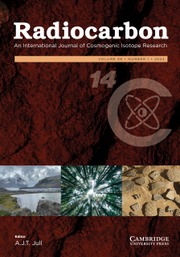Article contents
TESTING THE METHODS FOR DETERMINATION OF RADIOCARBON CONTENT IN LIQUID FUELS IN THE GLIWICE RADIOCARBON AND MASS SPECTROMETRY LABORATORY
Published online by Cambridge University Press: 07 June 2022
Abstract
Determining the biocomponents in liquid fuels using radiocarbon radioisotope (14C) dating requires sample preparation adaptations to the conditions of the Gliwice Radiocarbon and Mass Spectrometry Laboratory. Liquid scintillation counting (LSC), and accelerator mass spectrometry (AMS) were investigated using six samples, including one 14C-free fuel and modern hydrotreated vegetable oil (HVO). For AMS, samples were prepared using tin capsules for liquids for EA combustion and graphitization in an AGE system. For LSC, liquid fuels were prepared by mixing with purified preheated sand and a benzene synthesis line. Benzene resublimation was also tested. IRMS measurements were also conducted for benzene to account for isotopic fractionation. Sample background measurements using both methods showed good performances by both AMS and LSC without resublimation. Comparable results were also obtained for HVO.
- Type
- Conference Paper
- Information
- Radiocarbon , Volume 64 , Issue 6: 3rd Radiocarbon in the Environment Conference Gliwice, Poland, July 5–9, 2021 , December 2022 , pp. 1447 - 1456
- Copyright
- © The Author(s), 2022. Published by Cambridge University Press for the Arizona Board of Regents on behalf of the University of Arizona
Footnotes
Selected Papers from the 3rd Radiocarbon in the Environment Conference, Gliwice, Poland, 5–9 July 2021
References
REFERENCES
- 4
- Cited by



